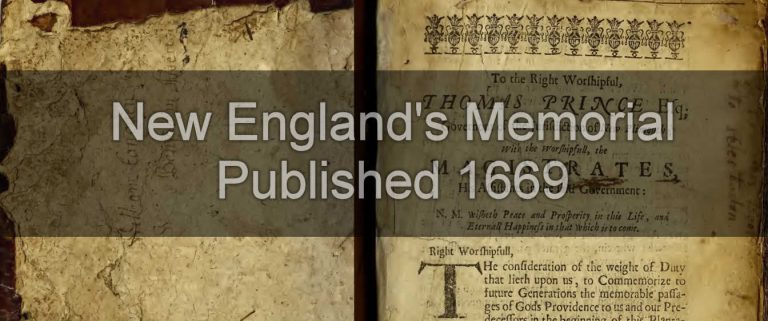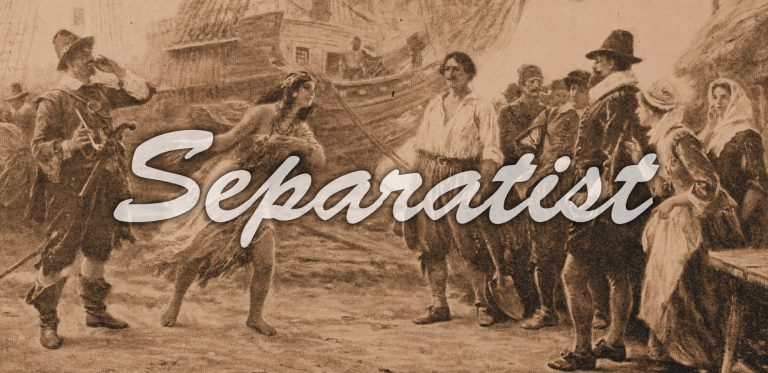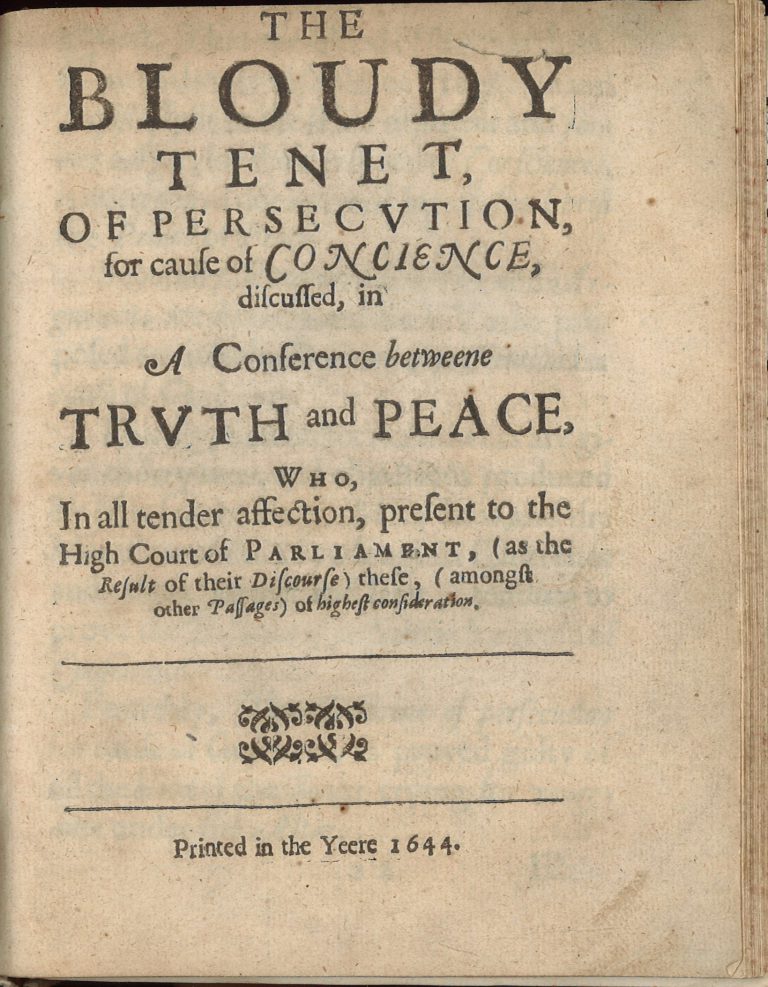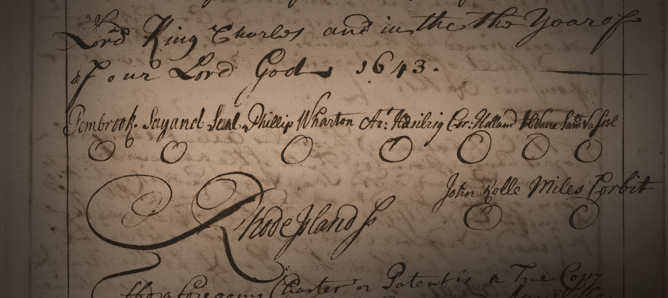Read, Search, Print, or Download PDF:
New England's Memorial by Nathaniel Morton, published 1669.
—
Relevant Book Notes
(Personal family history research by Mike Prestwood.)
Some Based on William Bradford’s Manuscripts
From the intro:
“Nathaniel Morton was the nephew of William Bradford. Much of this memorial is based on his uncle’s manuscripts left in his study from 1620-1946.”
Roger Williams–The seed of baptism.
From the intro:
“I HAVE for some length of time looked upon it as a duty incumbent, especially on the immediate successors … first beginners of this plantation in New England, to commit to writing … showing to the generations to come … how that God brought a vine into this wilderness ; that he cast out the heathen and planted it; that he made room for it, and caused it to take deep root, and it filled the land ; so that it hath sent forth its boughs to the sea and its branches to the river.”
Bulk of Roger Williams info
Starting on page 78 for notes on Roger Williams.
In the year 1634, Mr. Roger Williams removed from Plymouth
to Salem ; he had lived about three years at Plimouth,
where he was well accepted as an assistant in the ministry to
Mr. Ralph Smith, then pastor of the church there, but by degrees
venting of divers of his own singular opinions, and seeking
to impose them upon others, he not finding such a concuiTence
as he expected, he desired his dismission to the
church of Salem, which though some were unwilling to, yet
through the prudent counsel of Mr. Brewster, the ruling elder
there, fearing that his continuance amongst them might cause
divisions, and there being many abler men in the bay, they
would better deal with him than themselves could, and foreseeing,
what he professed he feared concerning Mr. Williams,
which afterwards came to pass, that he would run the same
course of rigid separation and anabaptistry, which Mr. John
Smith, the se-baptist at Amsterdam had done ; the church of
Plimouth consented to his dismission, and such as did adhere
to him were also dismissed, and removed with him, or not long
after him, to Salem. He came to Salem in the time of ]Mr.
Skelton’s weakness, who lived not long after Mr. Williams was
come, whereupon after some time, the church there called him to office ; but he having in one year’s time, filled that place with
principles of rigid separation, and tending to anabaptistry, the
prudent magistrates of the Massachusetts jurisdiction sent to
the church of Salem, desiring them to forbear calling him to
office, which they hearkening to, was a cause of much disturbance
; for Mr. Williams had begun, and then being in
office, he proceeded more vigorously to vent many dangerous
opinions, as amongst many others these were some ; that it
is not lawful for an unregenerate man to pray, nor to take an
oath, and in special, not the oath of fidelity to the civil government
; nor was it lawful for a godly man to have communion,
either in family prayer, or in an oath, with such as
they judged unregenerate ; and therefore he himself refused
the oath of fidelity, and taught others so to do ; also, that it
was not lawful so much as to hear the godly ministers of England,
when any occasionally went thither, and therefore he
admonished any church members that had done so, as for
heinous sin; also he spake dangerous words against the
patent, which was the foundation of the government of the
INIassachusetts colony ; also he affirmed, that the magistrates
had nothing to do in matters of the first table, but only the
second ; and that there should be a general and unlimited
toleration of aU religions, and for any man to be punished for
any matters of his conscience, was persecution.
And further, he procured the church of Salem’s consent
unto letters of admonition, which were written and sent by
him, in their name, to the churches at Boston, Charlestown,
Newtown, (now Cambridge,) etc., accusing the magistrates,
that were members of the respective churches, of sundry
heinous offences, which he laid unto their charge ; and though
divers did acknowledge their error and gave satisfaction, yet
Mr. Williams himself, notwithstanding all the pains that was
taken with him by Mr. Cotton, Mr. Hooker, and many others,
to bring him to a sight of his errors and miscarriages, and,
notwithstanding all the court’s gentle proceedings with him,
he not only persisted, but grew more violent in his way, insomuch
as he staying at home in his own house, sent a letter,
which was delivered and read in the public church assembly,
the scope of which was to give them notice, that if the church
of Salem would not separate not only from the churches of
Old England, but the churches of New England too, he would
separate from them. The more prudent and sober part of the
church, being amazed at his way, could not yield unto him
;
whereupon he never came to the church assembly more, professing
separation from them as antichristian, and not only so,
but he withdrew all private religious communion from any
that would hold communion with the church there, insomuch
as he would not pray nor give thanks at meals with
his own wife nor any of his family, because they went to
the church assemblies. Divers of the weaker sort of the
church members, that had been thoroughly leavened with
his opinions, of which number were divers women that were
zealous in their way, did by degrees fall off to him, insomuch
as he kept a meeting in his own house, unto which a
numerous company did resort, both on the Sabbath day and
at other times in way of separation from, and opposition to
the church assembly there ; which the prudent magistrates
understanding, and seeing things grow more and more towards
a general division and disturbance, after all other means used
in vain, they passed a sentence of banishment against him
out of the Massachusetts colony, as against a disturber of the
peace, both of the church and commonwealth.*
After which Mr. Williams sat down in a place called Providence,
out of the IMassachusetts jurisdiction, and was followed
by many of the members of the church at Salem, who
did zealously adhere to him, and who cried out of the perse-
cution that was against him ; some others also resorted to
him from other parts. They had not been long there together,
but from rigid separation they fell to anabaptistry, renouncing
the baptism which they had received in their infancy, and
taking up another baptism, and so began a church in that
way ; but Mr. Williams stopped not there long, for after some
time he told the people that followed him, and joined with
him in a new baptism, that he was out of the way himself,
and had misled them, for he did not find that there was any
u]^on earth that could administer baptism, and therefore their
last baptism was a nullity, as well as their first ; and therefore
they must lay down all, and wait for the coming of new
apostles ; and so they dissolved themselves and turned Seekers,
keeping that one principle, that every one should have
liberty to worship God according to the light of their own
consciences ; but otherwise not owning any churches or ordinances
of God anywhere upon earth.
Thus much was thought meet to be inserted here concerning
the great and lamentable apostasy of JVIr. Williams, that
it may be a warning to all others to take heed of a gradual
declining from, and forsaking the churches of Christ, and
ordinances of God in them, lest they be left of God to run
such a course as he hath done; wherefore let him that
thinks he stands, take heed lest he fall, 1 Cor. x. 12 ; as also
to be a motive to the saints to remember him unto God in
their fervent prayers for his return, he having been sometimes
an able dispenser of the word of God, and, in several respects
of an exemplary conversation.
And yet that there may be a standing evidence of the care
that was had in those times to prevent the growth of errors,
and of the exercises of the communion of churches for that
end, it is thought meet further to insert this passage ; that
before the putting forth of the civil power of the magistrate
for the removing of Mr. Williams from Salem, and besides
other means also used, there was a public admonition sent in
writing from the church of Boston to the church of Salem, for
the reducing of Mr. Williams, and the erring part of the
church. The title of the wiiting was.
Errors in doctrine maintained by some of the iirethren of the church of Salem,
tending to the disturbance of relifjion and peace, in family, church, and
comtnomcealtk, namely,
1. That it is not lawful to call upon an unregenerate man
to pray for himself.
2. It is not lawful for a regenerate man to pray with his
carnal family.
3. It is not lawful for magistrates to take an oath of fidelity
from unregenerate men.
4. It is not lawful for magistrates to take an oath of fidelity
from the body of their subjects, though regenerate, and members
of churches.
5. It is not lawful for magistrates to punish the breaches of
the first table, unless thereby the civil peace of the commonwealth
be disturbed.
Whence also it follows, and is confessed.
That a church wholly declining into arianism, papism,
familism, or other heresies, being admonished, and convinced
thereof by other churches, and not reforming, may not be reformed
by the civil magistrate, in a w^ay of civil justice, unless
it break the civil peace.
These errors were solidly confuted, and the contrary truths
asserted, by the \vord of God, in that \vriting wliich was subscribed
by
John Cotton, Teacher of the church of Boston.
Thomas Oliver, ) 7^,, ^,, , , m T \ iLiaers of the sarae church.
IHO.MAS LiEVERETT,
)
•’
Mr. Wilson the pastor of the chm-ch being at that time
absent upon a voyage to England















